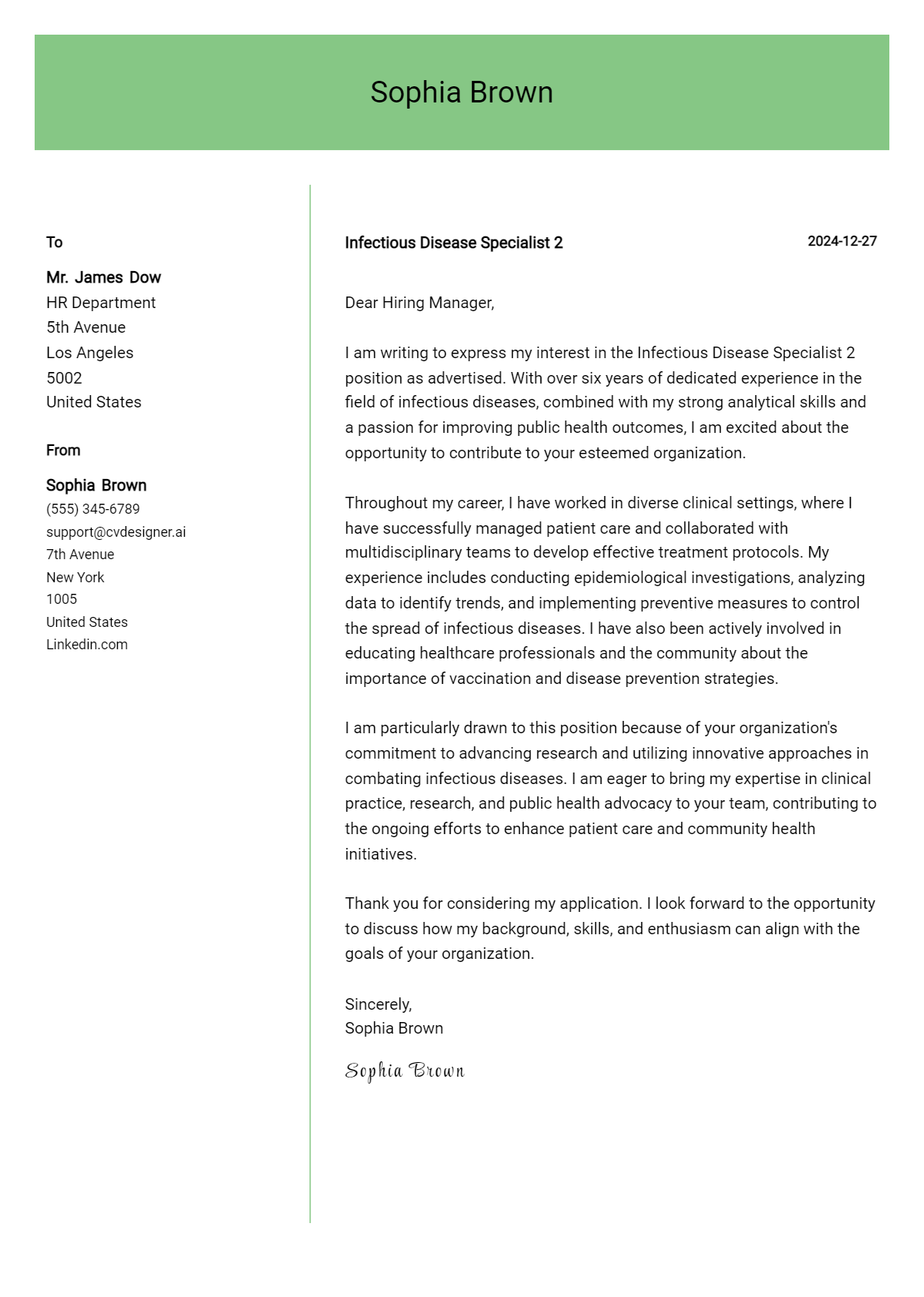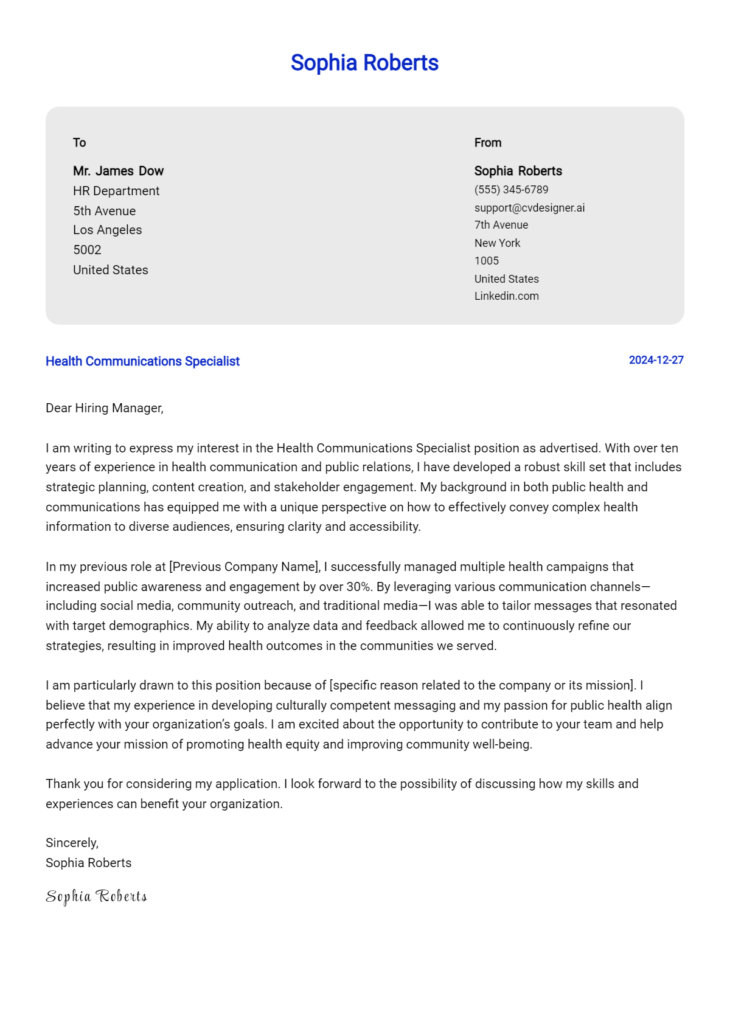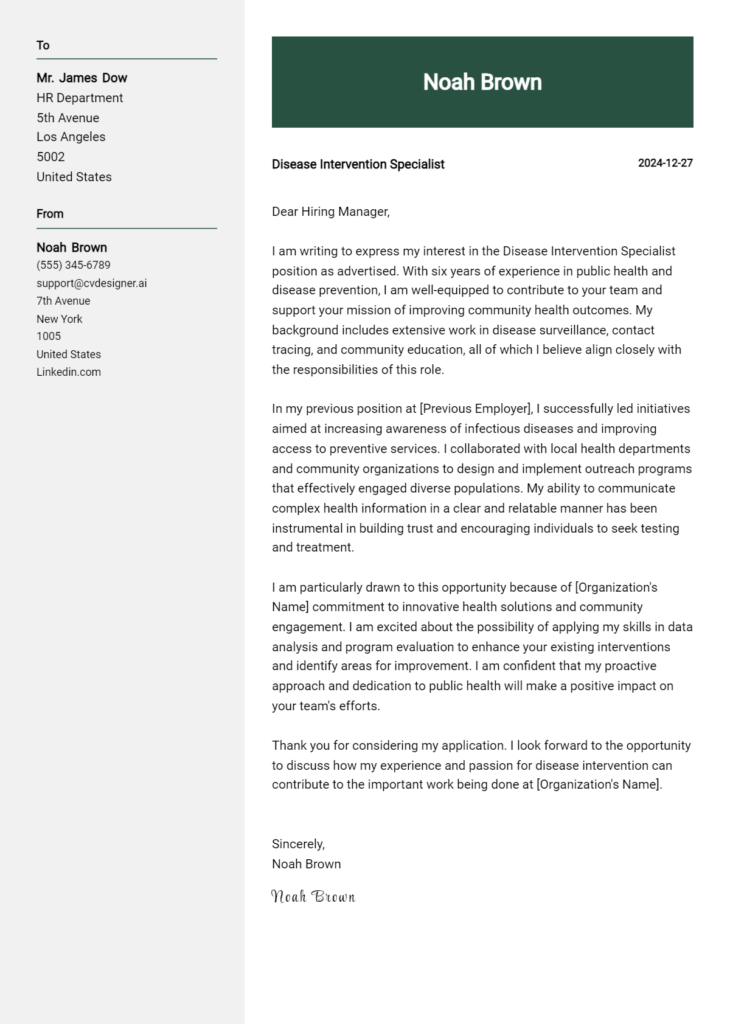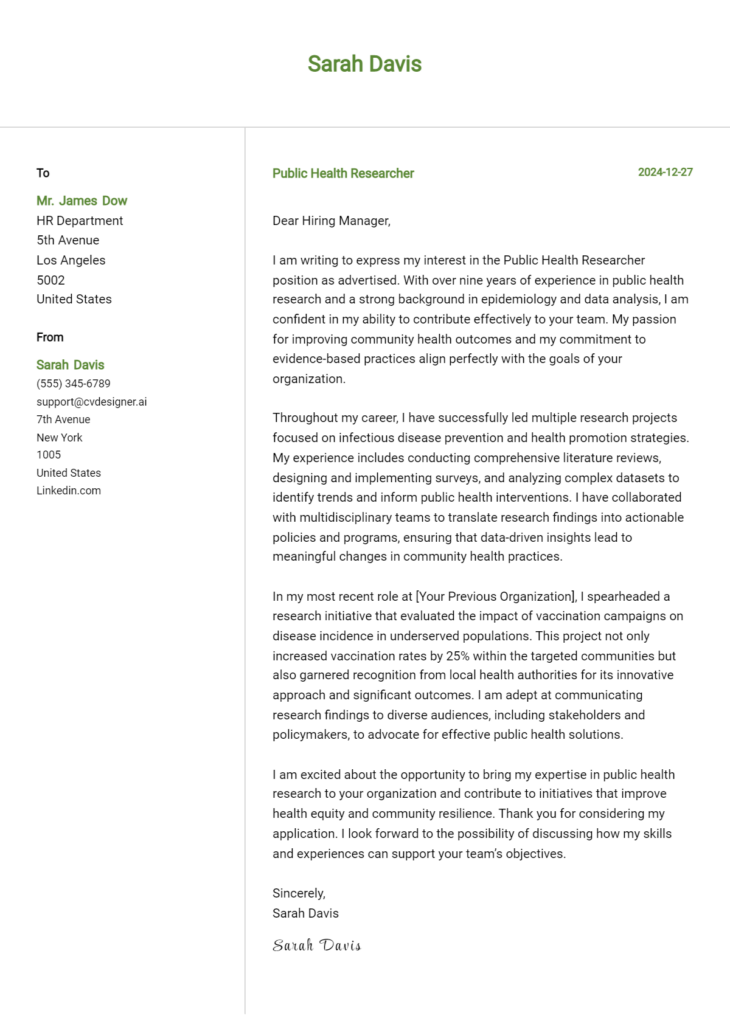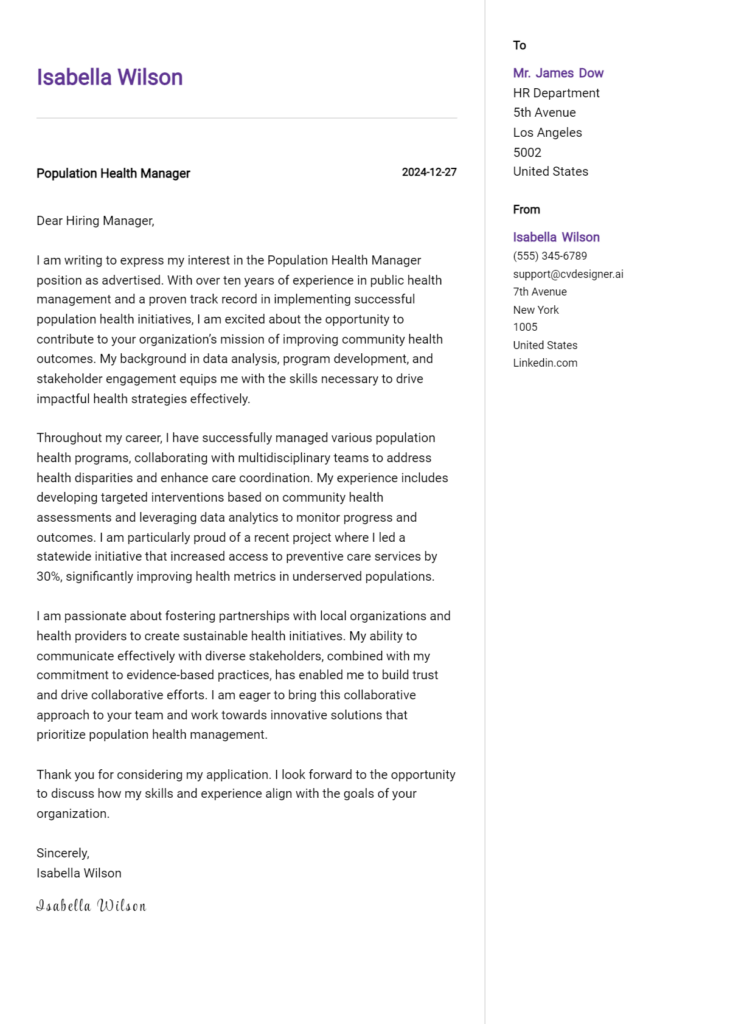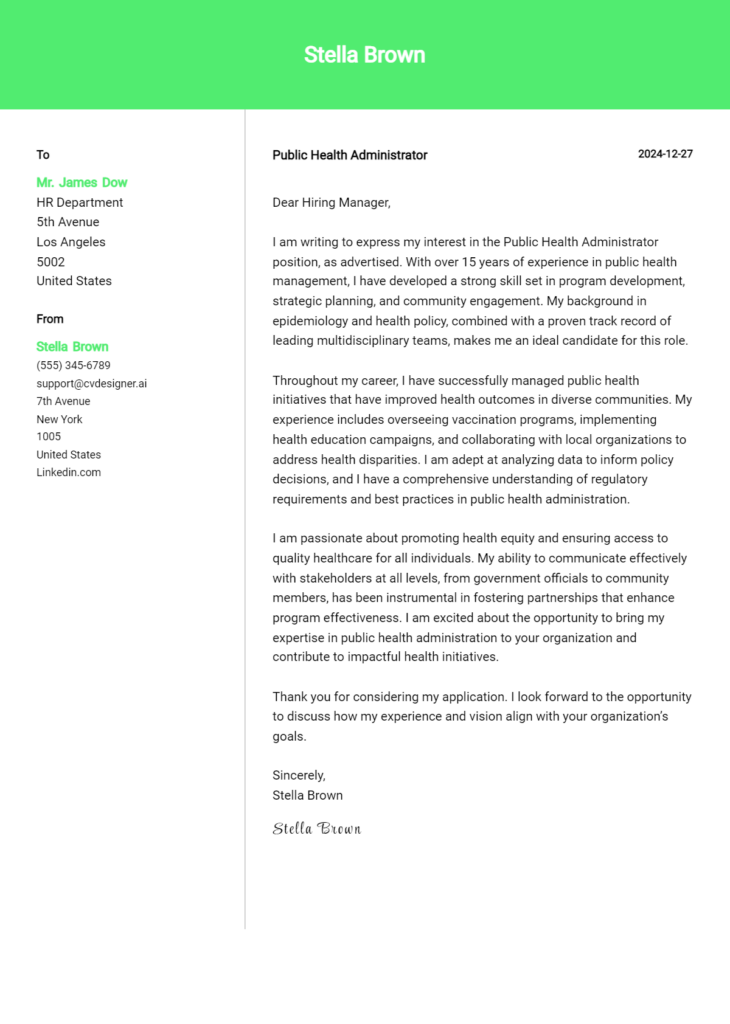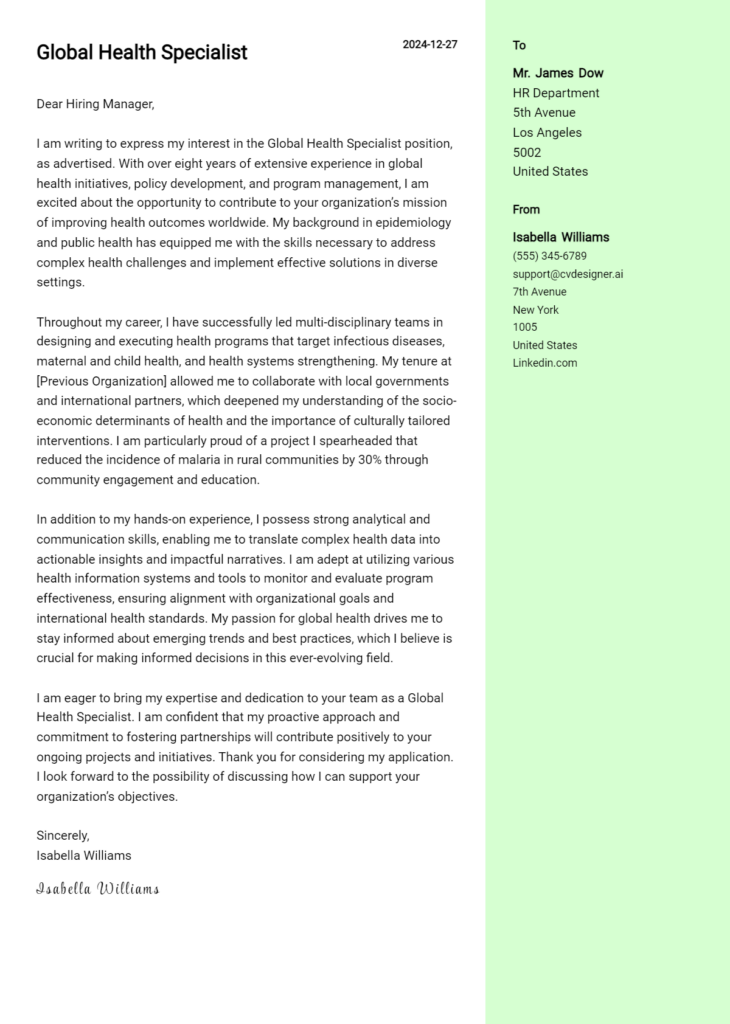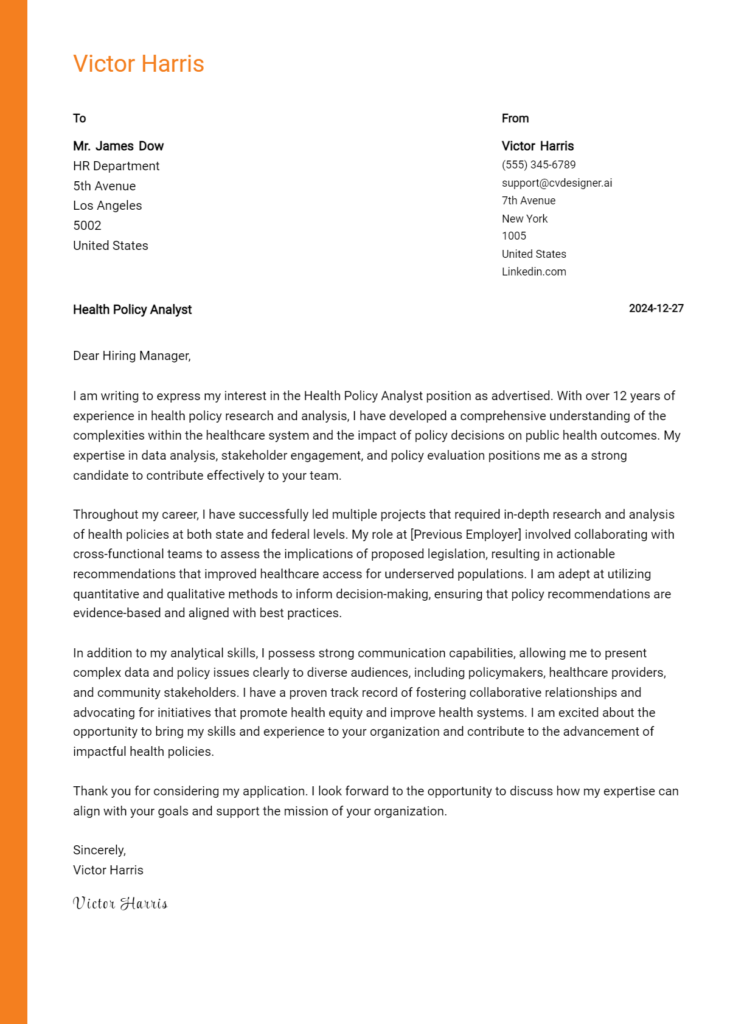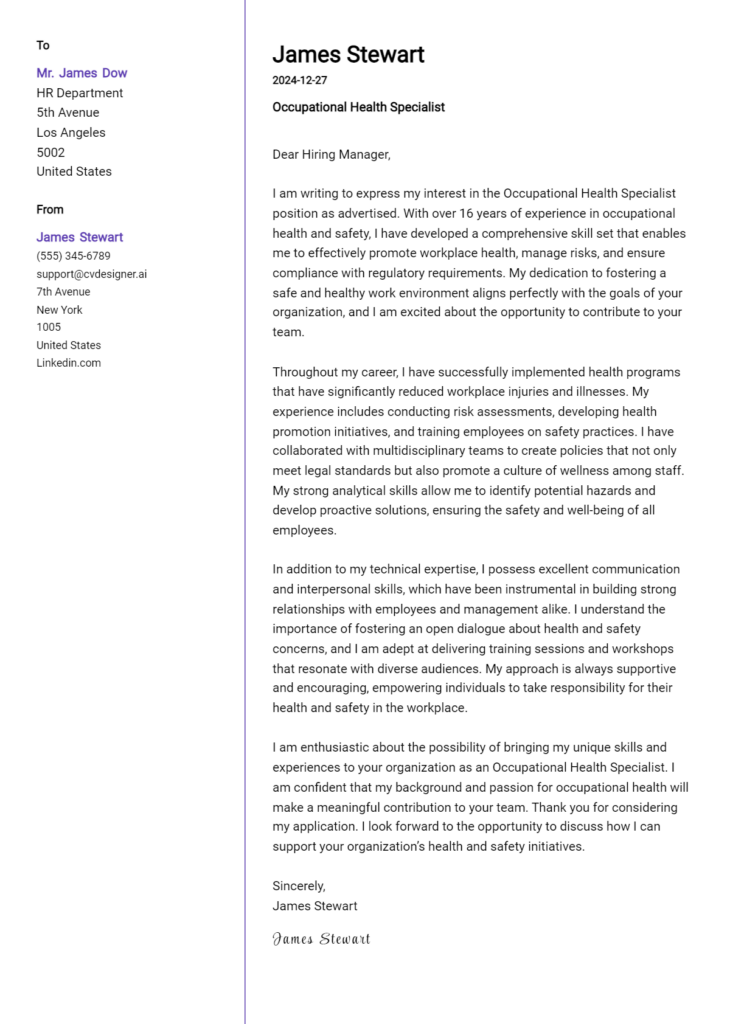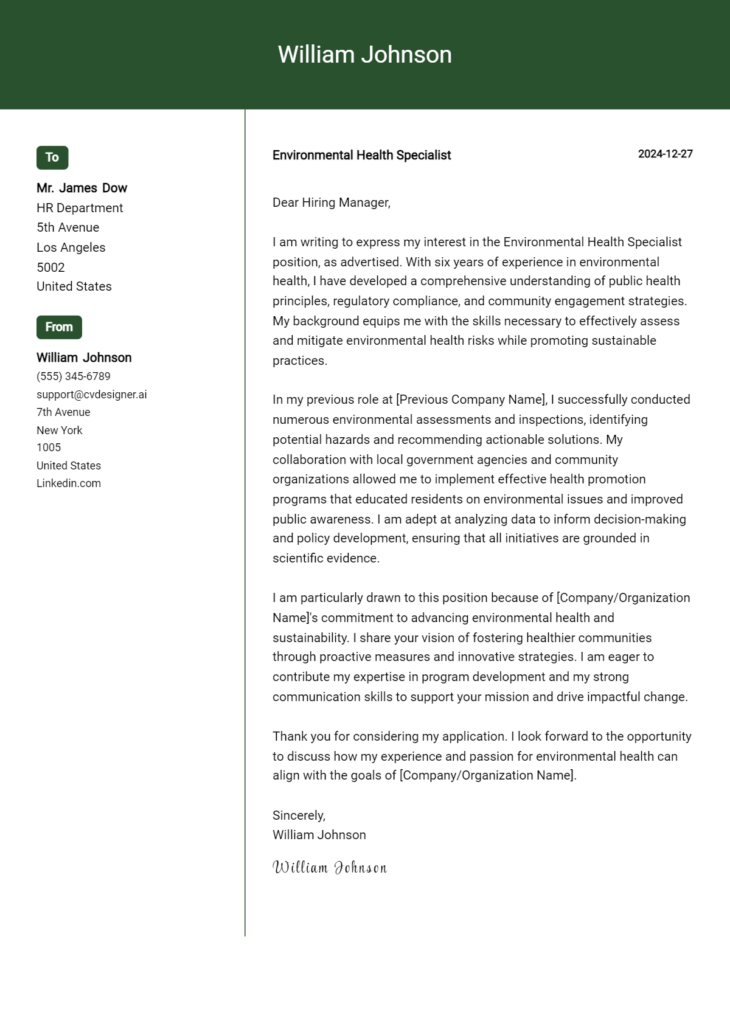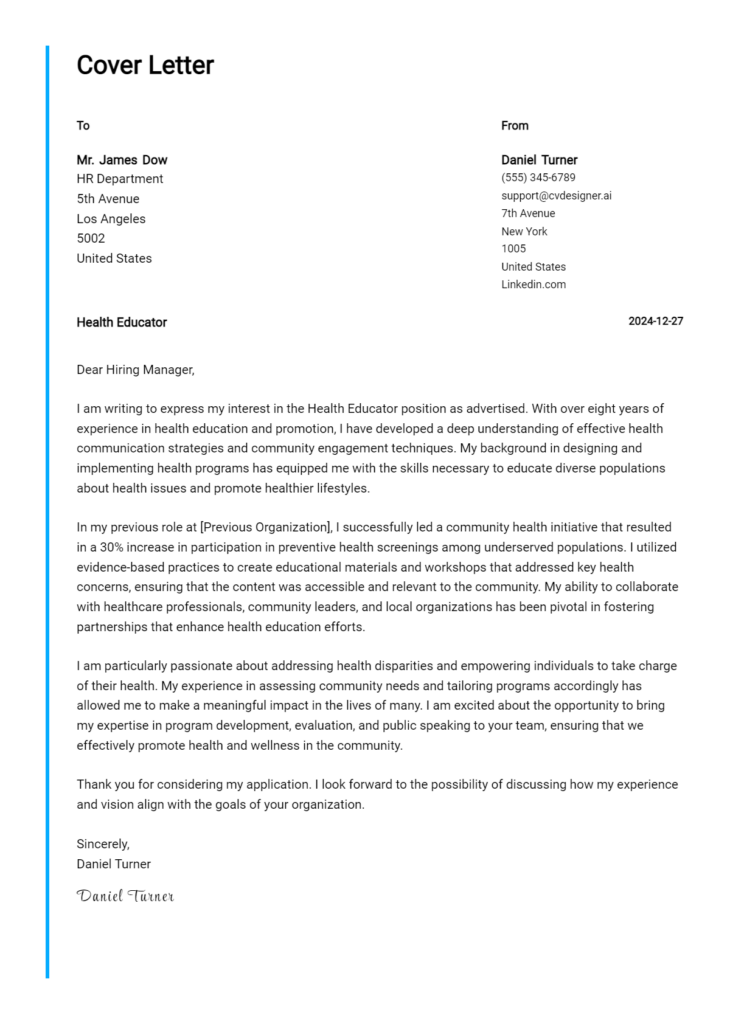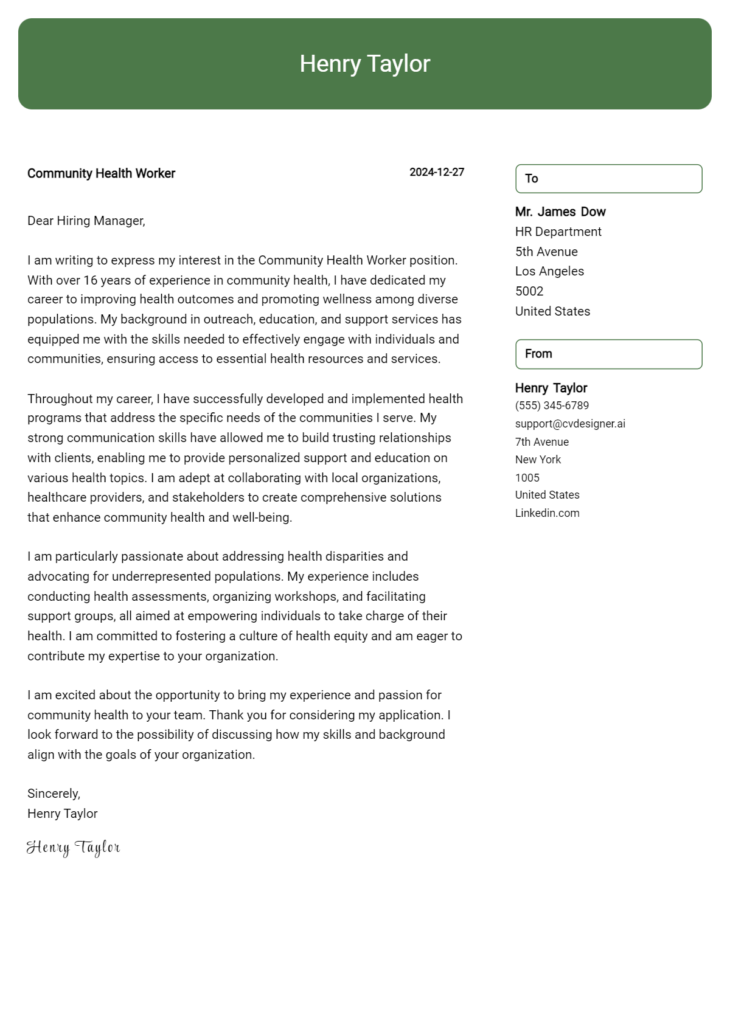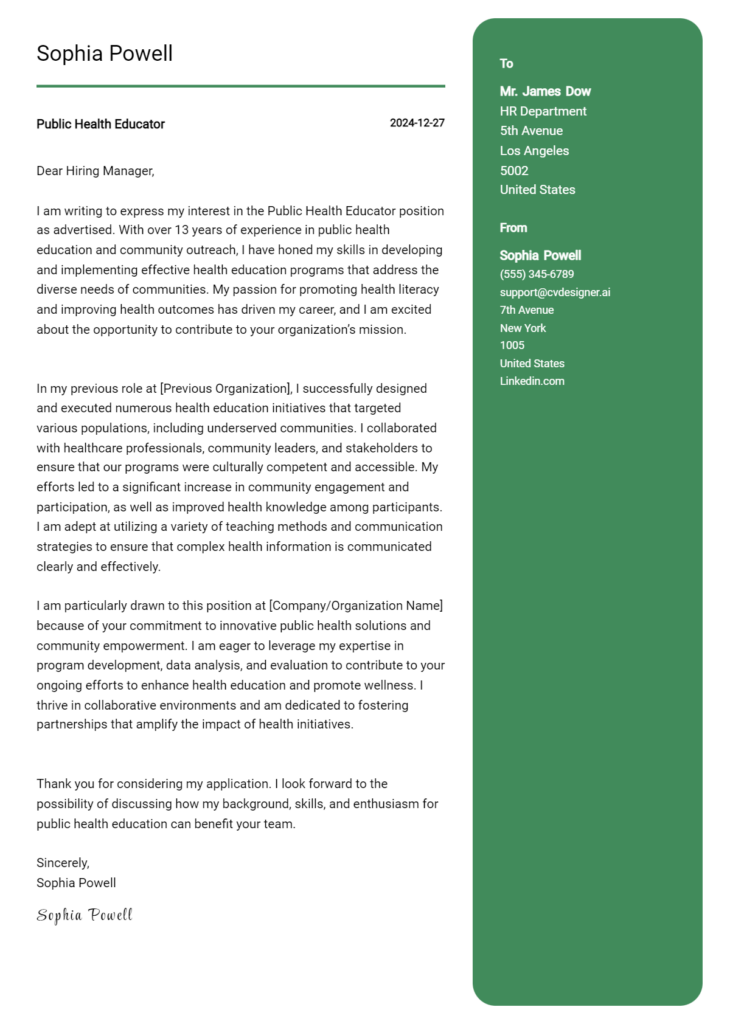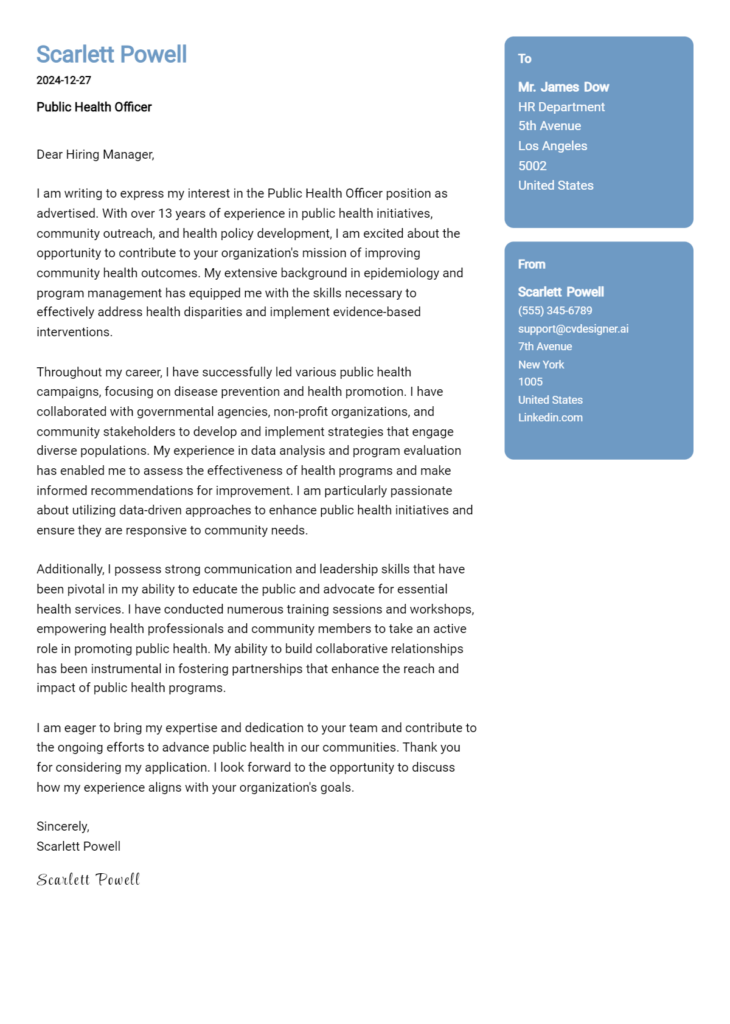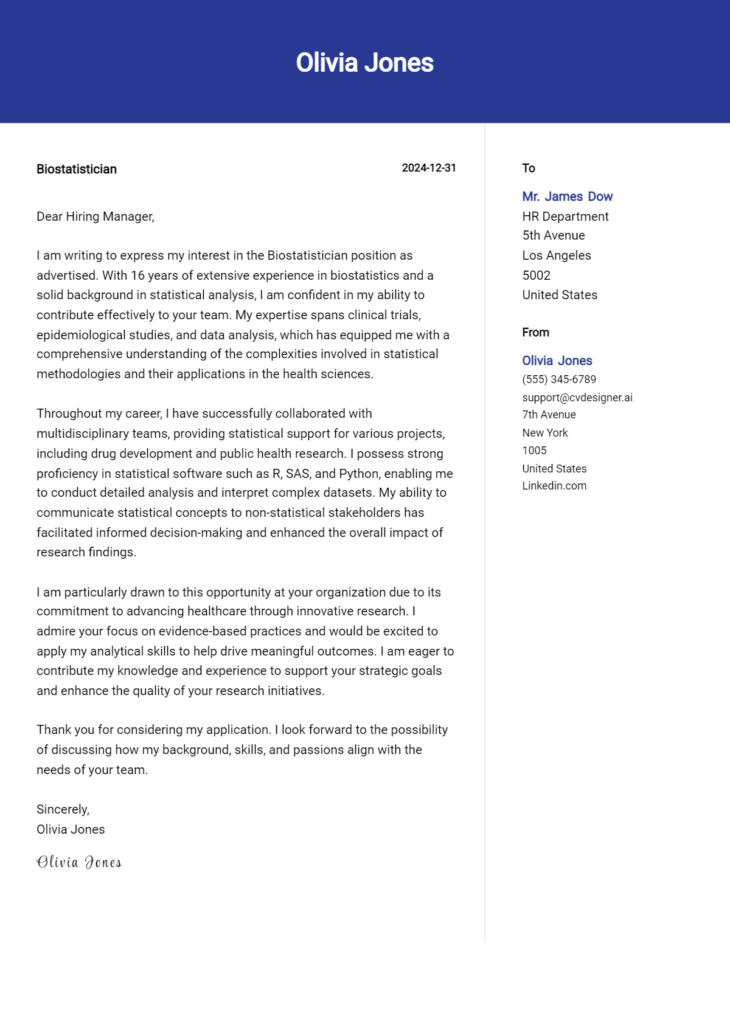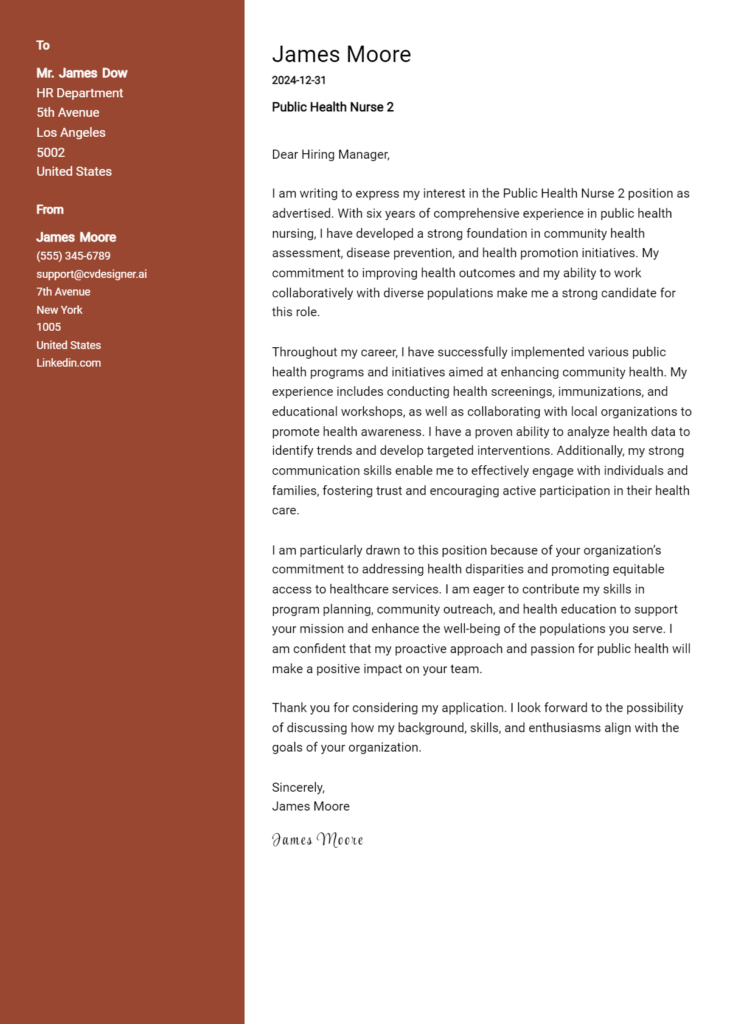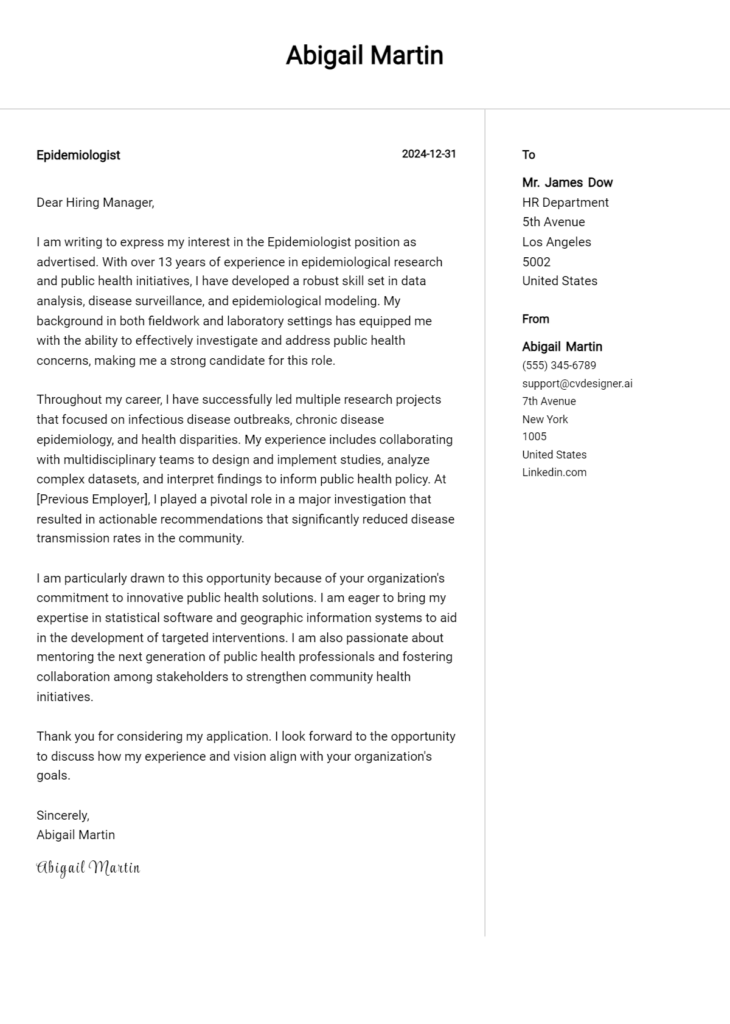Infectious Disease Specialist 2 Cover Letter Examples
Explore additional Infectious Disease Specialist 2 cover letter samples and guides and see what works for your level of experience or role.
How to Format an Infectious Disease Specialist Cover Letter
Crafting a powerful cover letter is essential for an Infectious Disease Specialist, as it serves as your first opportunity to showcase your expertise and commitment to public health. The way you format your cover letter not only reflects your professionalism but also highlights your analytical skills and attention to detail—qualities that are critical in the field of infectious diseases. A well-structured cover letter can effectively convey your passion for combating infectious diseases and your ability to work collaboratively within multidisciplinary teams.
In this guide, we will explore how to structure your cover letter, providing insights and specialist-specific examples to help you create a persuasive document.
We will focus on the essential components of a professional cover letter, including:
- Cover Letter Header
- Cover Letter Greeting
- Cover Letter Introduction
- Cover Letter Body
- Cover Letter Closing
Each section plays a crucial role in showcasing your qualifications and demonstrating your dedication to the field. Let’s break down each part and explain how to make your Infectious Disease Specialist cover letter stand out.
Importance of the Cover Letter Header for an Infectious Disease Specialist
The cover letter header is a crucial element of any professional correspondence, particularly for an Infectious Disease Specialist. It not only serves as the first impression to potential employers but also establishes the context of the communication. A well-structured header should include your contact information, the date, and the recipient's details. Clarity and professionalism are paramount, as they reflect your attention to detail and commitment to the role. A strong header sets a positive tone for the rest of the letter, while a weak one can detract from your qualifications and credibility.
Strong Example
Dr. Jane Smith, MD 123 Health Lane Cityville, ST 12345 janesmith@email.com (123) 456-7890 October 1, 2023 Dr. John Doe Chief of Infectious Diseases Health Center 456 Medical Blvd Cityville, ST 12345
Weak Example
Jane S. 123 Main St Cityville 10/1/23 To Whom It May Concern
The Importance of the Cover Letter Greeting for an Infectious Disease Specialist
The greeting of a cover letter serves as the first impression for the hiring manager, setting the tone for the entire correspondence. A well-crafted greeting not only demonstrates professionalism but also adds a personal touch by directly addressing the recipient. This shows that the applicant has taken the time to research the organization and the individual responsible for the hiring process. To avoid generic greetings like "To Whom It May Concern," it is vital to seek out the hiring manager's name through the company's website, LinkedIn, or by calling the office directly. Personalization can make a significant difference in capturing attention and conveying genuine interest in the position.
Strong Greeting Example
Dear Dr. Jane Smith,
Weak Greeting Example
To Whom It May Concern,
The Importance of a Strong Cover Letter Introduction for an Infectious Disease Specialist
A well-crafted cover letter introduction is crucial for an Infectious Disease Specialist, as it serves as the first impression that candidates make on hiring managers. This opening paragraph must not only capture the reader's attention but also convey genuine interest in the role and the organization. It should briefly highlight key skills or achievements relevant to infectious disease management, research, or public health. A compelling introduction can set the tone for the rest of the cover letter and differentiate a candidate from others, while a weak introduction can leave a negative impression and diminish the chances of securing an interview.
Strong Example
Dear [Hiring Manager’s Name], As an Infectious Disease Specialist with over a decade of experience in clinical research and patient care, I am excited to apply for the position at [Company/Organization Name]. My extensive background in epidemiology, coupled with my passion for advancing public health initiatives, has equipped me to make significant contributions to your team. My recent research on vaccine efficacy in underserved populations not only resulted in published findings but also enhanced community health outreach efforts, aligning perfectly with your organization's mission to combat infectious diseases.
Weak Example
To Whom It May Concern, I am writing to apply for the Infectious Disease Specialist position. I have some experience in the field, and I think I could do a decent job. I have worked on various projects and have a few skills that might be useful, but I am not sure if they are exactly what you're looking for.
Purpose of the Cover Letter Body for an Infectious Disease Specialist
The cover letter body serves as a critical platform for the candidate to present their unique qualifications and experiences as an Infectious Disease Specialist. This section should articulate how the candidate's skills align with the requirements of the role and the goals of the organization. It is an opportunity to highlight specific projects or accomplishments that demonstrate the candidate’s expertise in diagnosing and treating infectious diseases, conducting research, or implementing public health initiatives. By focusing on relevant achievements, such as successful outbreak responses or innovative treatment protocols, the candidate can effectively communicate their value to the prospective employer and differentiate themselves from other applicants.
Strong Example
I am particularly proud of my role in leading a multi-disciplinary team during the recent outbreak of Zika virus in our region, where we successfully implemented a community-based response plan that reduced transmission rates by 40% within three months. My experience in epidemiological research, including a publication on antibiotic resistance patterns, equips me with the analytical skills necessary to identify trends and develop effective interventions. I am eager to bring my expertise in infectious disease management and public health advocacy to your organization, contributing to your mission of enhancing community health outcomes.
Weak Example
I have worked in the field of infectious diseases for several years and have some experience with outbreaks. I think I would be a good fit for your team because I have knowledge of various diseases. I am looking forward to the opportunity to work with you and hope to bring my experience to your organization.
Importance of the Cover Letter Closing for an Infectious Disease Specialist
The closing paragraph of a cover letter is crucial as it serves to summarize the candidate's qualifications, reinforce their enthusiasm for the position, and prompt the hiring manager to take the next step, such as reviewing the resume or scheduling an interview. A strong closing can leave a lasting impression, while a weak one may diminish the overall impact of the application.
Strong Example
Thank you for considering my application for the Infectious Disease Specialist position. With my extensive experience in clinical research and public health, coupled with my dedication to combating infectious diseases, I am excited about the opportunity to contribute to your esteemed team. I look forward to the possibility of discussing how my background aligns with your needs—please feel free to review my resume, and I hope to schedule an interview soon to explore this further.
Weak Example
I hope you look at my resume. I want to work for your hospital. Thank you for your time.
These tips will help candidates craft an effective cover letter for an Infectious Disease Specialist position. In this competitive field, it’s essential to showcase your technical skills, problem-solving abilities, knowledge of the Software Development Life Cycle (SDLC), teamwork capabilities, and a passion for continuous learning. A well-crafted cover letter can set you apart from other candidates and demonstrate your suitability for the role.
Tips for Writing an Effective Cover Letter for Infectious Disease Specialist
Highlight Technical Skills: Clearly outline your expertise in infectious diseases, including specific areas of research, diagnosis, and treatment. Mention any relevant certifications or training that bolster your qualifications. Providing concrete examples of how you applied these skills in previous roles will strengthen your candidacy.
Emphasize Problem-Solving Abilities: Infectious Disease Specialists often face complex challenges. Use your cover letter to describe situations where you successfully identified issues and implemented effective solutions. Highlight your analytical skills and how they contribute to better patient outcomes or research advancements.
Demonstrate SDLC Knowledge: If your role involves utilizing technological tools or software in research or patient management, mention your familiarity with the Software Development Life Cycle. Discuss how you have contributed to software projects, whether through data analysis, user testing, or collaborating with IT teams, showcasing your ability to bridge healthcare and technology.
Showcase Teamwork and Collaboration: Infectious Disease Specialists frequently work in interdisciplinary teams. Use your cover letter to illustrate your ability to collaborate effectively with healthcare professionals, researchers, and public health officials. Provide examples of successful projects or initiatives where teamwork played a critical role.
Express a Passion for Continuous Learning: The field of infectious diseases is ever-evolving, and showing enthusiasm for ongoing education can set you apart. Mention any recent courses, certifications, or conferences you have attended. Convey your commitment to staying current with the latest research and advancements in the field, which is essential for providing the best care and making informed decisions.
By following these tips, candidates can create a compelling cover letter that highlights their qualifications and enthusiasm for the role. For additional resources, consider exploring our cover letter templates or using our cover letter builder to streamline the writing process.
Common Mistakes to Avoid in an Infectious Disease Specialist Cover Letter
Avoiding common mistakes in your cover letter is crucial for capturing the attention of hiring managers in the competitive field of infectious disease. A well-crafted cover letter can set you apart from other candidates, demonstrating your expertise and commitment. Here are some common pitfalls to steer clear of:
Generic Greeting: Addressing the letter to "To Whom It May Concern" can signal a lack of effort. Always try to find the hiring manager's name for a personalized touch.
Repetition of Your Resume: Simply reiterating your resume can bore the reader. Instead, use your cover letter to highlight your unique experiences and skills, focusing on how they relate to the role.
Lack of Specificity: Vague statements can weaken your case. Provide specific examples of your accomplishments, such as successful case studies or research projects related to infectious diseases.
Ignoring the Job Description: Failing to align your qualifications with the job requirements can be detrimental. Carefully analyze the job description and tailor your letter to reflect how your skills and experiences meet those needs.
Poor Formatting: A cluttered or inconsistent format can detract from your message. For guidance on proper cover letter format, ensure your letter is professional and easy to read.
Typos and Grammatical Errors: Mistakes in your cover letter can give a negative impression. Always proofread your letter and consider asking a colleague to review it before submission.
Failure to Convey Passion: Not expressing genuine interest in the role can make your letter forgettable. Share your passion for infectious disease work and why you are drawn to the position.
By avoiding these common mistakes, you can create a compelling cover letter that effectively showcases your qualifications and enthusiasm for the infectious disease specialist role. For inspiration, check out various cover letter examples to see how others have successfully conveyed their experiences.
Cover Letter FAQs for Infectious Disease Specialist
What should I include in my cover letter as an Infectious Disease Specialist?
In your cover letter, you should start with a strong introduction that highlights your passion for infectious disease research and clinical practice. Include relevant experience such as your education, board certifications, and any specialized training in infectious diseases. Highlight specific skills that are pertinent to the role, such as patient management, research capabilities, and familiarity with current infectious disease protocols and treatments. Additionally, mention any relevant publications or presentations that demonstrate your expertise. Finally, conclude with a strong statement of your desire to contribute to the institution’s mission and how your background aligns with their goals.
How can I demonstrate my passion for infectious disease in my cover letter?
To demonstrate your passion for infectious disease, share personal anecdotes or experiences that fueled your interest in this field. This could include your volunteer work in infectious disease clinics, your research projects, or any leadership roles in public health initiatives. Discuss specific cases or outbreaks that motivated you to pursue this specialty, and how they shaped your understanding of the complexities involved in managing infectious diseases. Express your commitment to ongoing education and staying current with research developments, showing that you are proactive about your professional growth and the impact you can have in this field.
How do I tailor my cover letter for a specific job application?
To tailor your cover letter, start by researching the organization and the specific role. Identify the key qualifications and responsibilities mentioned in the job description. Reflect on your experiences and skills that align with these requirements. Use specific language from the job posting to demonstrate your fit, incorporating keywords and phrases that resonate with the hiring managers. Highlight relevant projects or roles that showcase your expertise in infectious disease management, epidemiology, or clinical trials. Lastly, customize your closing paragraph to express why you are particularly interested in that institution or position, making it clear that you are enthusiastic about the opportunity.
Should I include my research experience in the cover letter?
Yes, including your research experience in your cover letter is crucial, especially as an Infectious Disease Specialist. Research is a significant aspect of this field, and showcasing your contributions can set you apart from other candidates. Detail specific projects you have worked on, emphasizing your role, the methodologies used, and any impactful outcomes. Mention publications or presentations that resulted from your research, as these validate your expertise and commitment to advancing knowledge in infectious diseases. Additionally, linking your research experience to how it informs your clinical practice can demonstrate your ability to bridge the gap between theory and application, making you a well-rounded candidate.
Build your Cover Letter in minutes
Use an AI-powered cover letter builder and have your letter done in 5 minutes. Just select your template and our software will guide you through the process.

